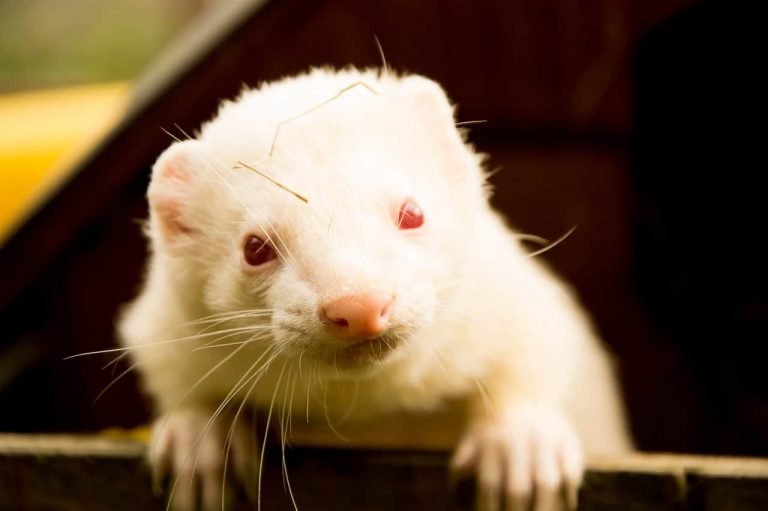Are Ferrets Hypoallergenic?
Allergies can make owning a pet seem impossible. Red, itchy eyes, constant sneezing – it really ruins the fun. So, many people just avoid having animals in their homes.
You might have heard that ferrets are different. Some folks think they are excellent pets, even for allergy sufferers. Is this true, though? Let’s look closer to see if ferrets are hypoallergenic and what you can do about any allergies.
Are Ferrets Hypoallergenic
Are ferrets truly allergy-free pets? Not really. While very rare, some people do report allergic reactions to them. No big clinical studies have been done on this yet, though.
A ferret’s main allergen is dander. This is just dead skin cells. Ferrets groom themselves by licking their fur. Their saliva contains a special protein. This protein can trigger an allergic reaction in some people. When dander sheds and gets into the air, you might breathe it in. Or, it can touch your skin directly.
Sometimes, people aren’t allergic to a ferret’s fur itself. Instead, it’s other body fluids that cause problems. A ferret’s urine, feces, or sweat can have more of that specific protein. This might be enough to cause a reaction. It all depends on how sensitive your body is to that protein.
Even though ferret allergies can happen, they are not common. Some experts think this is because of how ferrets shed. They have two types of fur: an undercoat and a guard hair. The undercoat is thick and keeps them warm. The guard hair is for fending off water and dirt. It doesn’t shed easily. This makes it less likely to cause a reaction.
Ferrets also shed fur less often than cats or dogs. Cats and dogs can shed many times a month, raising allergy chances. Ferrets only shed twice a year. This makes managing a ferret allergy much easier.
Plus, ferrets make less saliva than cats or dogs. Since less saliva transfers to their fur when they groom, there is less of the allergy-causing protein. It’s less likely to cause a reaction.
Common allergy symptoms include sneezing, a runny nose, itchiness, trouble breathing, red eyes, and face pressure. Most symptoms are mild and don’t last long. But, some people can have severe, life-threatening reactions. These are called anaphylactic reactions.
Do Ferrets Affect Asthma
Asthma is a lung problem that causes airways to swell when you breathe in something you are allergic to. People often get diagnosed with asthma as kids or when they hit puberty. With proper care, it’s usually manageable. Sometimes, it even gets better over time.
Many people with asthma also have other allergies, like hay fever or eczema. Studies show about 60% of people with asthma are allergic to pets. Dander is tiny and floats in the air, making it an airborne allergen.
So, yes, a person with asthma can have an attack if they are around ferret dander. How bad the attack is depends on how sensitive their body is to the dander they inhale.
For example, I know a guy who’s allergic to many airborne things. His wife got a ferret. He rarely had any symptoms. So, they decided to get a second ferret, for company. That same night, he went to the emergency room. He had a bad asthma attack.
Doctors thought the dander from two ferrets was simply too much for him. His symptoms got better once the second ferret went back to the store. He could manage his asthma with just one ferret in the house.
It’s important that anyone with asthma checks how they react to ferrets. Do this before you go into a home with ferrets or think about getting one as a pet.
How to Manage Ferret Allergies
Before you get any pet, talk to an allergist. They can give you tests, like a RAST test. These tests help figure out if you’re allergic to animals like cats, dogs, birds, or ferrets. An allergist can also suggest allergy shots. These shots can lower the chances of having allergy attacks.
You can also visit animal shelters. Spend some time there to see if you get symptoms like sneezing or itching around specific animals. Going to a pet store is not the best idea. There are usually many animals in a small space there. It is hard to tell which animal’s dander is causing your allergy.
Other simple things can help. Keep your hands clean by washing them often. Make sure your house is clean. Consider getting an air filter. Washing your hands and cleaning your ferret’s litter box regularly helps reduce your exposure to allergens.
Common Pet Allergies
Allergies are very common around the world. Over 20% of people suffer from them. They are actually one of the top chronic health problems globally. About one in five people deals with some type of allergy.
Pets are a frequent cause of these issues. The American College of Allergy, Asthma, and Immunology reports that about three in ten people are allergic to animals. Cats and dogs are the most common culprits. Cat allergies happen most often because of a protein in their fur and saliva. It’s called the Fel d 1 allergen.
Many people believe animal fur causes allergies. But that’s not quite right. The allergic reaction comes from substances stuck in the fur. These substances can be found all over the animal.
So, an animal’s fur, saliva, sweat, shedding, urine, and other body fluids can all trigger an allergic reaction. When these touch your skin or you breathe them in, your body sees them as a threat. No animal is truly “allergy-free” because any protein they produce might cause a reaction. This is true whether it happens often or very rarely.
However, certain traits, like how much an animal sheds, can lower the chance of a reaction.
What is a Good Pet for Someone with Allergies
If you have allergies but still want a pet, some animals are less likely to cause problems. This is because they shed less fur and produce less dander. Here are some options:
- Fish
- Turtles
- Reptiles (like the Bearded Dragon)
- Hamsters
- Gerbils
- Canaries
- Bunnies
- Mini Pigs
Anyone who tends to get allergies should see an allergist before bringing a new pet home. Ferrets can be a great pet choice since ferret allergies are rare. Still, they can happen. So, you should always take steps to prevent any allergic reactions.







